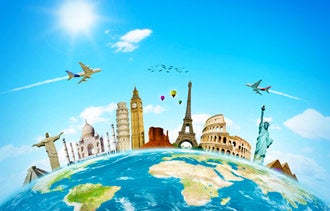How Much Should You Spend on Business Travel? When you're footing the bill it's up to you: business class or public transportation?
Opinions expressed by Entrepreneur contributors are their own.
Bear left or right? That's my conundrum each time I drive to the airport for a business trip. Left leads to economy parking, a $12 daily rate and a brief wait for the terminal shuttle. Right is the long-term lot: $21 per day, but just a three-minute walk to check-in.
I approach, I calculate, I consider. And I turn right every time.
As the sole employee of my own business, I frequently pay all or part of my travel expenses. That means I can live on the road as well -- or as poorly -- as I want. With no shareholders or board of directors to set policy, I can fly business class, stay at the Ritz-Carlton and rent sports cars. Or I can fly coach, check in to a Motel 6 and take the bus.
In fact, I do none of those things. Over the years, I've zeroed in on a certain standard of living as a business traveler. If I had to peg it somewhere, it would be a half-notch above how I live at home.
I'm well aware that the money I earn on my trips should be used for sustaining my family, paying my mortgage and saving for retirement, not squandered on expensive wine at a fancy restaurant where I'm dining alone. But I also know that a happy worker is a productive worker. I've learned that when I travel, it makes sense to treat myself at least as well as I'd want my employees to be treated, if I had any.
Still, that leaves plenty of wiggle room--and moments of indecision on every trip. Is it sushi or tacos? A chilly post-dinner walk back to the hotel, or a $12 cab ride? Splurge for extra legroom on a flight or an upgrade to a suite? And the hardest of all: Should I pay the $50 penalty to catch an earlier flight home when I find I've finished my work with hours to spare?
There's no right answer. Often my spending habits on the road will depend on how business is going. If I've just landed new assignments, I'm more likely to splurge on a pricey meal. Or if someone is covering my expenses, I might get a $15 bourbon and pay for it myself, secure in the knowledge that the rest of my day's spending was minimal.
Recently I spent time in San Diego with a friend who stages wine competitions. Each year he flies first class to France to visit producers, adding an extra $5,000 or so to his expenses. I wondered how he justified it.
He explained that running a business is more than a profit-loss statement to him. It's an affirmation of his independence, tangible evidence of a successful career move made after years of working for other people. "For three or four years when I started, I didn't earn anything," he said. "I lived off savings." Now 62, he's ready for the payoff. He's not irresponsible with his money, but he eats well, drinks well and travels in style.
I couldn't help remembering that when I flew home early the next morning. I might have left the hotel half an hour early and caught a shuttle. But I decided that an extra 30 minutes of sleep was worth $25.
I had the front desk call me a cab.












